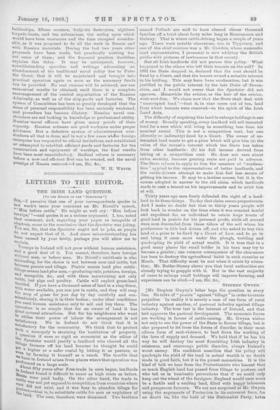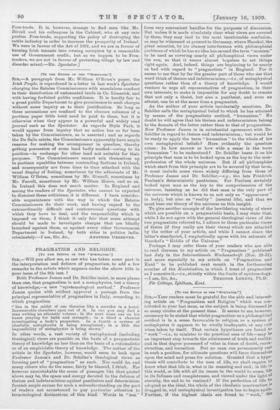THE IRISH LAND QUESTION, at will.
"'Men before cattle.' He might as well cry : 'Men before look back in wonder on the time when it was counted lawful turnips,' "—and and expedient for an individual to retain huge tracts of quotes it as a serious argument. I, too, noted
that comment, and, regarding your paper as incapable of good land in prairie for his personal profit, while all around claptrap, came to the conclusion that the Spectator was joking. were men descended from those tillers of the soil whom his You see, Sir, that the Spectator ought not to joke, as people predecessor in title had driven off, and who asked to buy this do not expect that of it. And since misunderstanding has land at a price to be fixed by a Court of Law, and to go in been caused by your levity, perhaps you will allow me to and bring it once more under the plough, trebling and
Land Acts.
mr, H. WHITE. tiou" applied to the representatives of better landlords, and
the cattle-drivers attempt to make him feel less secure of getting his income. It may he a lawless course, but it is the
LETTERS TO THE EDITOR. course adopted in answer to the old claim which landlords
made to rent a tenant on his improvements and to evict him
[To THU EDITOR OP "SPECTATOR"] Thirty years ago men freely defended the right of a land- perceive that one of your correspondents quotes in lord to do these things. To-day that claim seems preposterous. And make no doubt but that in thirty years people will last week's issue your comment on Mr. Bh•rell's speech,
"'Men before cattle.' He might as well cry : 'Men before look back in wonder on the time when it was counted lawful turnips,' "—and and expedient for an individual to retain huge tracts of quotes it as a serious argument. I, too, noted
that comment, and, regarding your paper as incapable of good land in prairie for his personal profit, while all around claptrap, came to the conclusion that the Spectator was joking. were men descended from those tillers of the soil whom his You see, Sir, that the Spectator ought not to joke, as people predecessor in title had driven off, and who asked to buy this do not expect that of it. And since misunderstanding has land at a price to be fixed by a Court of Law, and to go in been caused by your levity, perhaps you will allow me to and bring it once more under the plough, trebling and explain. quadrupling its yield of actual wealth. It is true that in a Turnips in Ireland will not grow without human assistance, good many places the small holder in his turn may try to end a good deal of it. You cannot, therefore, have turnips become a grazier; one ruinous consequence of the clearances a'ithout men, or before men. Mr. Bh•rell's antithesis is also has been to destroy the agricultural habit in such counties as lllisleading, for the choice is not between men and cattle, but Meath. That difficulty must be met when it exists by educe- between prairie and tillage. • Prairie means land plus cattle : tion; Mr. Butler-Stoney shows you that local authorities are crop of grass for you day by day carefully and con- line. He talks of "prairie " against" tillage" in order to create ee'entiously, storing it in their bodies ; under ideal conditions prejudice. In reality it is merely a case of one form of rural need human assistance only to sell and buy them. The industry against another, of pastoral industry against tillage Aeration is so simple that for an owner of land it has industry. The true test is the interest of Ireland, and that great natural attractions. But for his neighbours who want test approves the pastoral development. The economic forces 10 utilise their power of labour the arrangement is not are working in favour of cattle-raising. Mr. Gwynn wishes 4:.t„i'factory. We in Ireland do not think that it is not only to use the power of the State to favour tillage, but is ",afitotory for the community. We think that to protect also prepared to let loose the forces of disorder, in their most --jnau a monopoly is straining the 'institution of property. odious form of mob-violence, to beat down the working of t4, question if even so rigid an economist as the editor of the laws of supply and demand. We hold that if he has his ti7: Spectator would justify a landlord who cleared all the way he will destroy the most flourishing Irish industry in 'age farmers off his land because he thought he could existence, and encourage public disorder, always Ireland's ,g,:t a' higher or a safer rental by letting it as pasture, or worst enemy. His confident assertion that his policy will by farming it himself as a ranch. The trouble that quadruple the yield of the land in actual wealth is no doubt he ;lava in Ireland arises from places where that operation was made in good faith, but it is the purest moonshine. It is the ilortned on a large scale. , tiout fifty years kind of talk we hear from the Protectionists who lament that after Free-trade in corn began, landlords so much English land has passed from tillage to pasture, and Veland found it difficult to exact as high rents as before. who tell us in bombastic perorations that if we could only catlItIt8 Were paid badly. On the other hand, the trade in keep out the wheat of the foreigner, England would once more sent B was not yet exposed to competition from countries where be a fertile and a smiling land, filled with happy labourers did not exist, and it was easy to abandon tillage for and prosperous farmers. We are not surprised at Mr. Gwynn Free-trade. It is, however, strange to find men like Mr. BirrelL and his colloagaes in the Cabinet, who at any rate profess Free-trade, supporting the policy of destroying the cattle industry in order to increase the prosperity of Ireland. We were in favour of the Act of 1881, and we are in favour of turning Irish tenants into owning occupiers by a reasonable use of Government credit; but as we happen to be Free- traders, we are not in favour of protecting tillage by law and disorder mixed.—En. 'Spectator.]





































 Previous page
Previous page